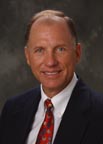September 07, 2005
SIUC's Kohler is new head of national association
Carbondale, IL -- Christopher C. Kohler, director of the Fisheries and Illinois Aquaculture Center at Southern Illinois University Carbondale, will assume the presidency of the American Fisheries Society Sept. 13, serving a one-year term.The 9,000-member society, which is the field's oldest and largest professional association, emphasizes scientific knowledge and professional training as a means for conserving fish and aquatic ecosystems in a sustainable way.
As president, Kohler will represent the group at international meetings, at state chapter meetings and at national public policy hearings. He also will preside over the governing board. In addition, he will set the society's agenda for the coming year through a detailed "plan of work."
Kohler will focus on three areas: aquatic stewardship; information transfer and outreach; and member services.
Destruction of habitat is the biggest challenge the society faces in its stewardship of "fish and other things wet and wild," Kohler said.
Whether it's the Gulf of Mexico "dead zone" created by farm chemicals washing off the land and into the rivers and streams that feed the Mississippi River or the loss of wetlands and shorelines to development, habitat loss comes down to human activity.
"You could say that fish are the central figures in a story where the ending is unknown and where the only certainty is that the dastardly villains are humans — it is our very existence and activities that so often cause tragedy to fishes," Kohler said.
"The human need for energy, dwellings and other pursuits are often at odds with fish habitat. When you try to strike a balance, the compromise often isn't fair — at least from the fish's point of view. But we need to remember that all things that adversely affect the fish ultimately affect our quality of life."
The society's newly approved North American Agenda for Aquatic Resources will provide a way to promote sound stewardship, Kohler said.
"It's an action agenda, many years in the making and carefully vetted, designed to make sure that globally threatened aquatic resources are at the forefront of thinking when regulators and policy makers make their decisions," he said.
"We're not trying to work as a lobbying group — there are others who can do that — but we want to make sure that government officials know the science behind the argument, that they know we are an important source of science-based information about fisheries and aquatic ecosystems and their conservation, management and development."
The society also will reach out to the general public by publishing regular articles geared toward lay readers.
"Scientists can talk to themselves all they want, but it's the public who votes — they have a big impact on what happens," Kohler said. "We need to get the science written in such a way that it's understandable to an audience that doesn't have a scientific background.
"We want to make sure people know how valuable these resources are and that they're renewable — sustainable. That's a buzzword, but it means being able to keep things going or even improving them. If we don't, over time those resources won't be there for future generations."
Other goals over the next year include starting a new journal focusing on ocean-dwelling fish and boosting student involvement in all levels of the society.
Kohler, who has headed SIUC's fisheries center since 1999, came to the University in 1980. He earned his bachelor's in 1973 from St. Mary's College of Maryland, his master's in 1975 from the University of Puerto Rico and his doctorate in 1980 from Virginia Polytechnic Institute and State University.
Leading in research, scholarly and creative activities is among the goals of Southern at 150: Building Excellence Through Commitment, the blueprint for the development of the University by the time it celebrates its 150th anniversary in 2019.

